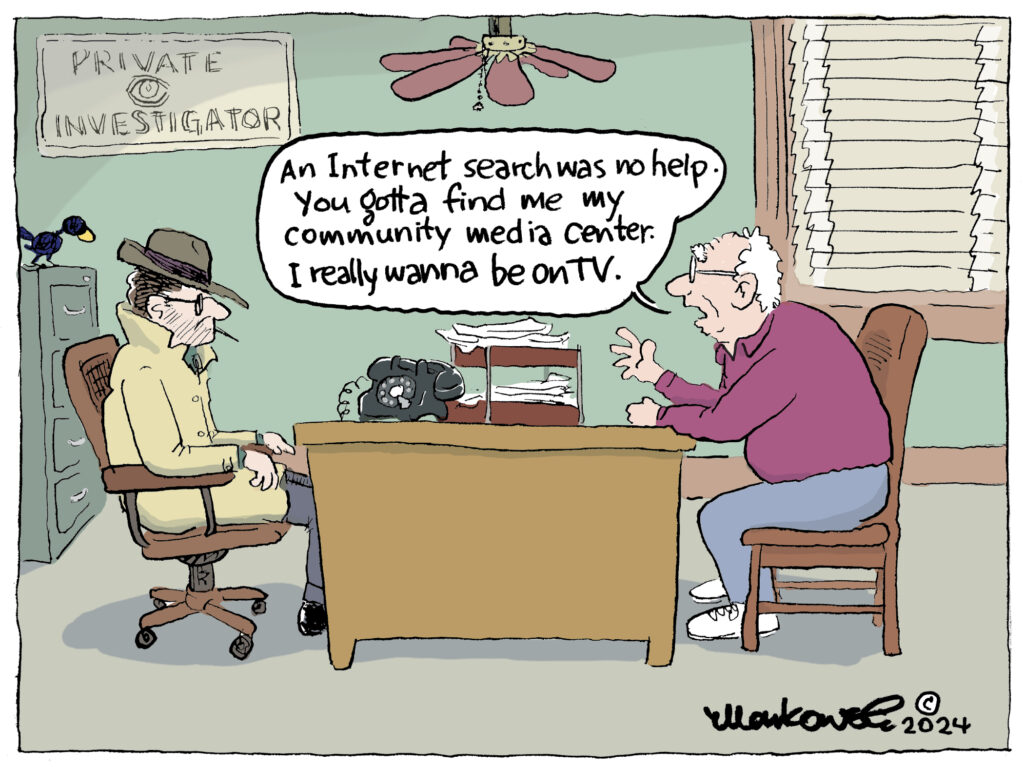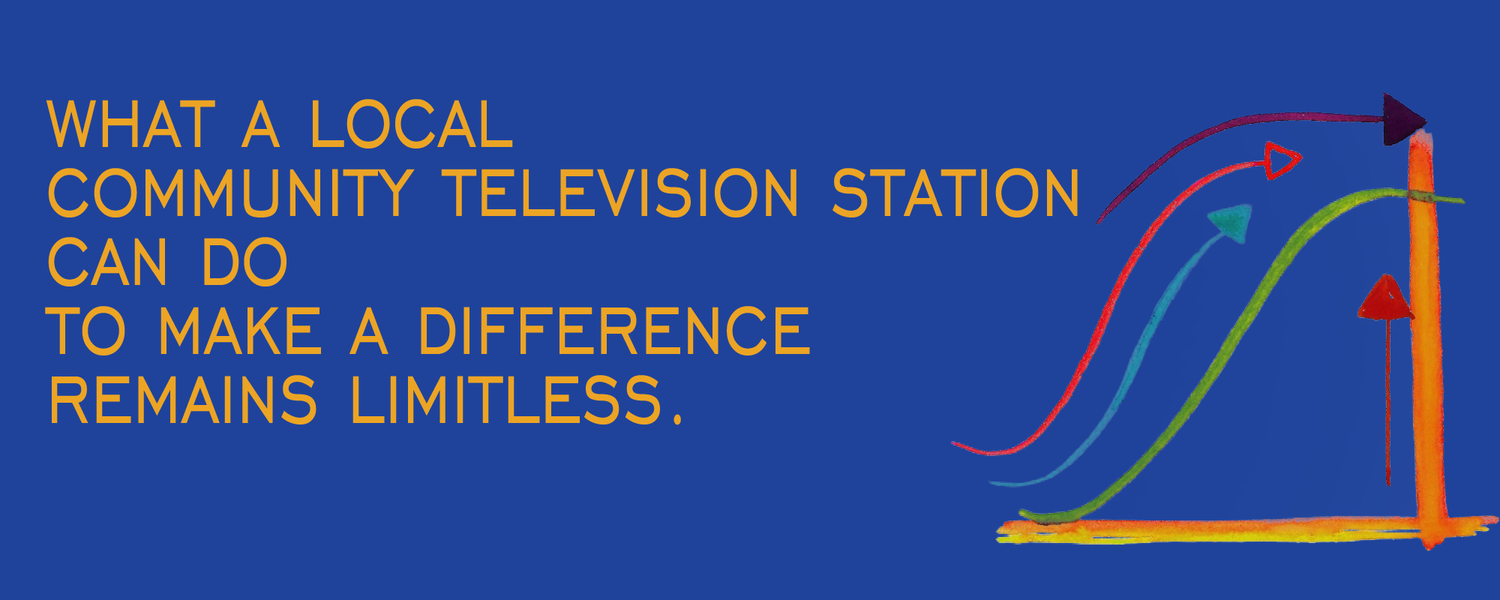
What we are is priceless because we are you, but even you do not know that. Every town has community media resources but you can not look up your ‘town’ on the internet and find your community media resources. They could be for your town or a collection of towns. It could be available as a nonprofit or a Dept. in a cable TV company. PSSST We do not call them Cable TV anymore.
Fortune 500, or 100, connectivity companies are rebranded cable TV companies using the same public utility polls to provide contemporary services without paying for the infrastructure costs of the new stuff (i.e. streaming).
Curt Huizenga, WPAA-TV Board Member
Public Utilities Regulatory Authority has failed all CT citizens with insufficient oversight of cable. This industry was deregulated in CT because it is easier to change the minds of legislators than justify failures in court. A wise attorney & advocate of community media affiliated with a nonprofit planning to close due to lack of funds impressed that fact upon me.
Some regulations remain including the promotion of community access services.
(d) Each company or organization shall conduct outreach programs and promote its community access services. Such outreach and promotion may include, but not be limited to (1) broadcasting cross-channel video announcements, (2) distributing information throughout the franchise area and not solely to its subscribers, (3) including community access information in its regular marketing publications, (4) broadcasting character-generated text messages or video announcements on barker or access channels, (5) making speaking engagements, (6) holding open receptions at its community access facilities, and (7) in multitown franchise areas, encouraging the formation and development of local community access studios operated by volunteers or nonprofit operating groups.
https://www.cga.ct.gov/current/pub/chap_289.htm#sec_16-331a (d)
As you can see, it is the cable companies’ legal responsibility to tell you how they are providing community media in every community. If you know enough to be interested in what community media resources are available, you can find some information here. But wouldn’t a search for your town providing facility location, type, and contact information be helpful? PURA is to provide consumer assistance and oversight. PURA’s role is clarified here (updated April 2024) – except you need to know acronyms (CAP, PEGPETIA) to find information about community media.
Deregulation with an Appearance of Progress
CT was the first state to ensure every community had ‘community media’ resources (a.k.a. PEG, Public Education and Government Access). But, BRAVO begins and ends with Public Act 95‐150 – An ACT CONCERNING COMMUNITY ACCESS OPERATIONS. In a forever, David & Goliath struggle, CT has failed to ensure that community media resources are sustainable, accessible, and relevant. Deregulation was codified in 2007. Concurrently, the industry was to keep legacy community media commitments in return for more tax breaks. Connecticut passed PA 07-253, described as “designed to promote cable competition by allowing telecommunications companies to provide video services without having to obtain a time-limited franchise or being subject to rate regulation. Federally, the move to allow the market to allocate resources resulted in the Cable Franchise and Communications Policy Act of 1984 (Cable Act of 1984). By 2003 it was evident that the 1996 Act to deregulate cable rates failed. Consumer cable prices rose three times the rate of inflation and even faster for ‘basic services’ for low-income families.
Deregulation lets market forces work on behalf of the consumer.
MYTH
Resources in Lieu of Taxes: The Illusive Deal
Fortune 500, even 100, companies are legally committed to providing ‘the people’ with access to media technology. Why, because they use public rights of way to deliver their services. Without the cable infrastructure, there would be no cable TV or Internet. No Fortunes.
However, they do not pay for access to you from their profits. Instead, they add a fee to your cable bill (not a tax, because it is their obligation). Community Media operators and volunteers oppose the fee. We believe in your fundamental right to tell your story, engage with your community, encourage youth to be media literate, and in general ‘people over profits’.
More than Rebranding: Legacy Terms As Weapons
Old language and changing technology add to the complexity of our survival in the public interest. Community Media income declines are escalating at a precipitous rate. Cord-cutting, or no interest in a cord by the current generation, decreases the cable TV subscriber population, the population wrongly saddled with the cost of community media. Restricting legislation to legacy terms was a successful tactic in the 2007 deregulation process. ISP protocol was not cable; therefore, the telecom industries’ foray into providing content viewed on television devices was not cable and not eligible for regulation. This use of legacy language effectively limits funds for Community Media. Less cable TV viewers = less community media income.
Technology advances every few months. With every advance, we become less relevant. Declining funds leave much of WPAA – TV and Community Media Center stuck in 2010-2015. Some nonprofit peers are using even older technology. We should be “early technology adopters for all members of our community” with an interest in conversation, storytelling, performance, and other creative pursuits. Instead, we often have less technology than what is readily available in middle-class homes. Some things did not even exist when terms and regulations were defined.
Community Media and Social Media are Not Equal
Corporate platforms & social media are not the same as community media. They are tools, not community resources. Tools that bombard you with requests to Boost. Pay Them. Similarly, we are not just another nonprofit. We are a resource for nonprofits. They have a right to media resources without cost.
The obligation to underwrite most of what we do from the profits of “connectivity” companies is lost on legislators who see themselves as business people. They see the results of an underfunded, deteriorating resource and expect outcomes that were never intended. What they see is not what we have the potential to be. It costs money, money we do not have, to provide what is possible. It takes updated laws to move us forward together. Most legislators have not seen community media making a difference so it is hard to convince them of our purpose & potential. They do not understand our obligation to serve whoever walks in the door. Many legislators have bought into the cable lobby playbook of myths. Our governor also sees himself as a businessman. He was a cable guy. The Governor and Senator Needleman, presumed to be focusing on relevance, fail to see our existence as our relevance. It is up the every community to find the relevance they need from the resources available.
We can not be your future if we have none.
HB5446: Tax Reform for Our Democracy Movement
The bill mentioned in this story will not come to the floor for a vote because it corrects our collective situation with tax reform. It stops the fees. It stops the municipal tax exclusions for these companies and it devises a level playing field for all profiting off of your public rights of way.
Will the cable companies successfully collapse the community media industry before their legacy infrastructure fails to deliver the SD signals they restrict community channels too, or vice versa
Sarcasm that proved to be vice versa for Frontier whose cable customers have not been able to see PEG channels for over 18 months.

